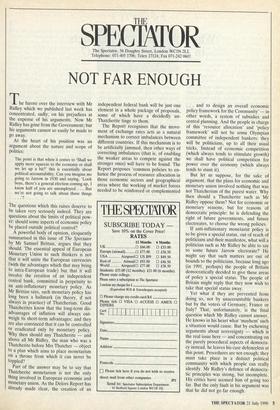S PECIAT O R
The Spectator, 56 Doughty Street, London WC1N 2LL Telephone: 071-405 1706; Telex 27124; Fax 071-242 0603
NOT FAR ENOUGH
The furore over the interview with Mr Ridley which we published last week has concentrated, sadly, on his prejudices at the expense of his arguments. Now Mr Ridley has gone from the Government; but his arguments cannot so easily be made to go away.
At the heart of his position was an argument about the nature and scope of politics:
The point is that when it comes to 'Shall we apply more squeeze to the economy or shall we let up a bit?' this is essentially about political accountability. Can you imagine me going to Jarrow in 1930 and saying, 'Look boys, there's a general election coming up, I know half of you are unemployed . . . But we're not going to talk about those things . . '?
The questions which this raises deserve to be taken very seriously indeed. They are questions about the limits of political pow- er: should some aspects of economic policy be placed outside political control?
A powerful body of opinion, eloquently summarised in this issue of The Spectator by Mr Samuel Brittan, argues that they should. The essential appeal of European Monetary Union to such thinkers is not that it will unite the European currencies (with the advantages which that may bring to intra-European trade) but that it will involve the creation of an independent central bank, committed in perpetuity to an anti-inflationary monetary policy. As Mr Brittan says, such monetary policy has long been a hallmark (in theory, if not always in practice) of Thatcherism. Good Thatcherites know that the long-term dis- advantages of inflation will always out- weigh its short-term advantages; and they are also convinced that it can be controlled or eradicated only by monetary policy. Why then should any Thatcherite — and above all Mr Ridley, the man who was a Thatcherite before Mrs Thatcher — object to a plan which aims to place monetarism on a throne from which it can never be toppled?
Part of the answer may be to say that Thatcherite monetarism is not the only thing involved in European economic and monetary union. As the Delors Report has already made clear, the creation of an independent federal bank will be just one element in a whole package of proposals, some of which have a decidedly un- Thatcherite tinge to them.
The Report recognises that the move- ment of exchange rates acts as a natural mechanism to correct imbalances between different countries. If this mechanism is to be artificially jammed, then other ways of correcting imbalances (that is, of enabling the weaker areas to compete against the stronger ones) will have to be found. The Report proposes 'common policies to en- hance the process of resource allocation in those economic sectors and geographical areas where the working of market forces needed to be reinforced or complemented . . . and to design an overall economic policy framework for the Community' — in other words, a system of subsidies and central planning. And the people in charge of this 'resource allocation' and 'policy framework' will not be some Olympian committee of independent bankers: they will be politicians, up to all their usual tricks. Instead of economic competition (which always tends to stimulate growth) we shall have political competition for power over the economy (which always tends to stunt it).
But let us suppose, for the sake of argument, that the plans for economic and monetary union involved nothing that was not Thatcherism of the purest water. Why then should a Thatcherite such as Mr Ridley oppose them? Not for economic or monetary reasons, but for reasons of democratic principle: he is defending the right of future governments, and future electorates, to choose the wrong policies.
If anti-inflationary monetarist policy is to be given a special status, out of reach of politicians and their manifestos, what will a politician such as Mr Ridley be able to say to some future Jarrow electorate? He might say that such matters are out of bounds to the politicians, because long ago (in 1991, perhaps) the people of Britain democratically decided to give these areas of policy a special status. The people of Britain might reply that they now wish to take that special status away.
Yet what if they are prevented from doing so, not by unaccountable bankers but by the voters of Germany, France or Italy? That, unfortunately, is the final question which Mr Ridley cannot answer. He knows in his heart what 'mayhem' such a situation would cause. But by eschewing arguments about sovereignty — which is the real issue here — and concentrating on the purely procedural aspects of democra- cy instead, he leaves his case defenceless at this point. Procedures are not enough; they must take place in a distinct political community with which people can really identify. Mr Ridley's defence of democra- tic principles was strong, but incomplete. His critics have accused him of going too far. But the only fault in his argument was that he did not go far enough.


















































 Previous page
Previous page